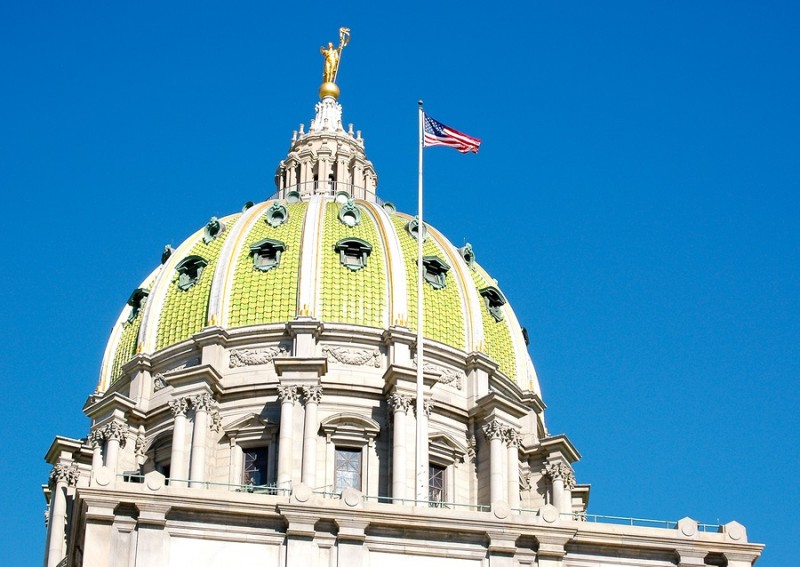HARRISBURG – As part of the House Republican effort to reinvent the operations and priorities of Pennsylvania government, the House approved legislation to stop pension costs from draining critical taxpayer resources away from schools, law enforcement and other important programs, House leaders said today.
With a bipartisan vote of 143-53, the bill now heads to the governor’s desk for signature.
The public pension reform plan, Senate Bill 1, will strengthen the state’s two public employee pension systems – the State Employees’ Retirement System (SERS) and the Public School Employees’ Retirement System (PSERS) — by requiring any new state or school district employee hired in 2019 or later to participate in a 401(k)-style plan.
This includes state workers, teachers, judges and members of the General Assembly. Current retirees and current workers or teachers will not be affected by this legislation, unless they actively choose to participate.
Eighteen states have enacted some 401(k)-style plan for state workers.
The public pension reform plan is projected to save taxpayers more than $5 billion and another $3 billion or more from reduced fees and costs through investment management changes.
Speaker of the House Mike Turzai (R-Allegheny): “This marks a historic point in Pennsylvania government, moving to a defined contribution plan for new hires in the public sector.
“Private sector employees have been in the defined contribution space for some time now. The dramatic increases in pension costs have put significant pressure on the taxpayers. This reform will protect future taxpayers’ hard-earned dollars while still providing competitive benefits for new hires.”
House Majority Leader Dave Reed (R-Indiana): “Passing the budget bill in April and now sending a public pension reform bill to the governor shows we are serious about changing how Pennsylvania government operates.
“Reforming the state’s public pension systems to help control taxpayer spending is a top priority; it comes down to restructuring an unaffordable pension system and working to invest those dollars in our schools and communities.”
House Majority Whip Bryan Cutler (R-Lancaster): “Some people may not feel this is the perfect bill. However, it’s important to remember that as we are reforming the system, the unfunded liability for benefits that have already been promised continues to grow.
“In a case like this, a strong bill that receives a vote is far better than a perfect bill that may never exist.”
Appropriations Committee Chairman Stan Saylor (R-York): “With pension obligations being the number one cost-driver for school districts and the state, pension reform is an absolute necessity to avoid property tax increases as well as cuts to essential services.
“This will help realign the state’s public pension systems with those of the private sector as part of our effort to reinvent Pennsylvania government.”
Republican Policy Committee Chairman Kerry Benninghoff (R-Centre/Mifflin): “Pension costs have long led to higher property taxes for homeowners and less money for classrooms.
“By addressing one of the biggest cost-drivers in the state budget and school district budgets throughout Pennsylvania, we are helping to stabilize budgets and helping the taxpayers by controlling costs.”
Caucus Chairman Marcy Toepel (R-Montgomery): “While the effects would not be felt immediately, this bill – which would be the biggest change to the pension system according to PennCAN – would eventually lessen the burden placed on taxpayers in the form of ever-increasing property taxes.
“As Commonwealth residents are being overcome by the costs of remaining in the homes they’ve had for decades, this bill should be a relief as it would eliminate the defined benefit plan currently being offered for new employees. By giving employees the option to choose from three plans, they would enjoy greater control of their savings and risk would be shifted away from taxpayers.”
Caucus Administrator Kurt Masser (R-Columbia/Montour/Northumberland): “Pension reform not only protects our taxpayers, but also enables the commitment to our retirees and current employees to be kept as promised.
“This is a responsible public pension reform plan that addresses flaws in the current system while protecting the taxpayers who foot the bill and ensuring our state workers and teachers the retirement security they deserve.”
Caucus Secretary Donna Oberlander (R-Clarion/Armstrong/Forest): “For the past decade, the pension mandate was taxing our ability to fund meaningful programs that our taxpayers truly want.
“The fact that we accomplished this goal, and can now refocus on our legislative priorities all while providing the promised benefits to our current retirees, is truly historic.”
Combined, SERS and PSERS have 863,000 active, vested and retired members, and an unfunded liability of approximately $62 billion.
The Independent Fiscal Office estimates that by 2019, pension payments by taxpayers will account for nearly 10 percent of the entire state General Fund budget.
In less than seven years, the unfunded pension liability has more than doubled from less than $30 billion to $62 billion.
The public pension reform plan in Senate Bill 1 would offer all new state and school district employees three different retirement planning options – a defined contribution plan similar to the 401(k) system offered by most employers in the private sector, or one of two hybrid plans which combine a 401(k)-style plan with a smaller defined benefit plan.
According to an analysis by the Pew Charitable Trusts, “This would be one of the most – if not the most – comprehensive and impactful reforms any state has implemented.”
The Pew report says Senate Bill1 will:
- Ensure Pennsylvania fulfills promises to state employees.
- Protect taxpayers by improving cost predictability.
- Preserve and improve retirement security for more workers.
- Save Pennsylvania $5 billion to $20 billion ($2 billion to $9 billion in present value) over 30 years depending on investment performance.
- Increase transparency.
